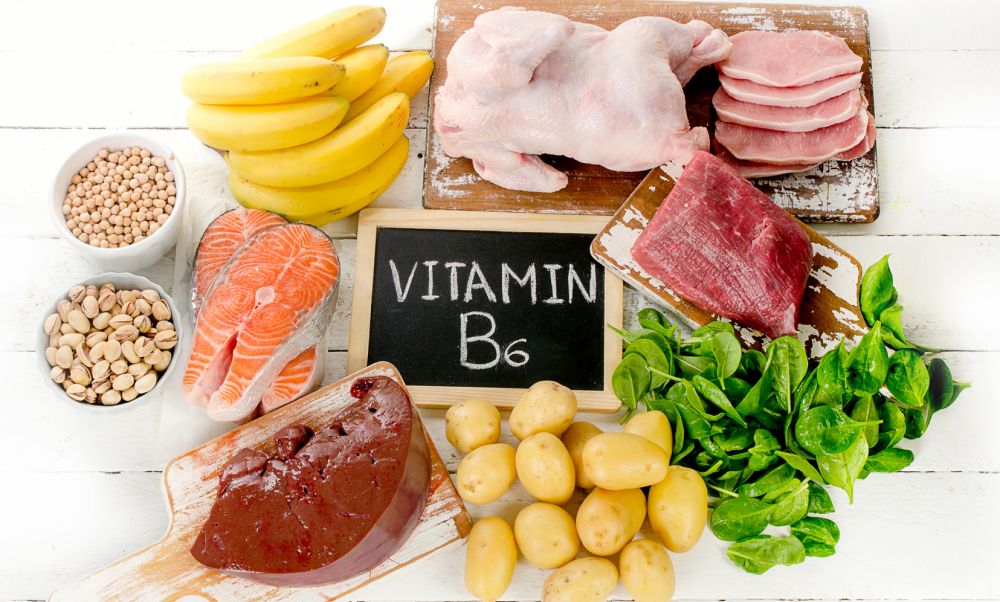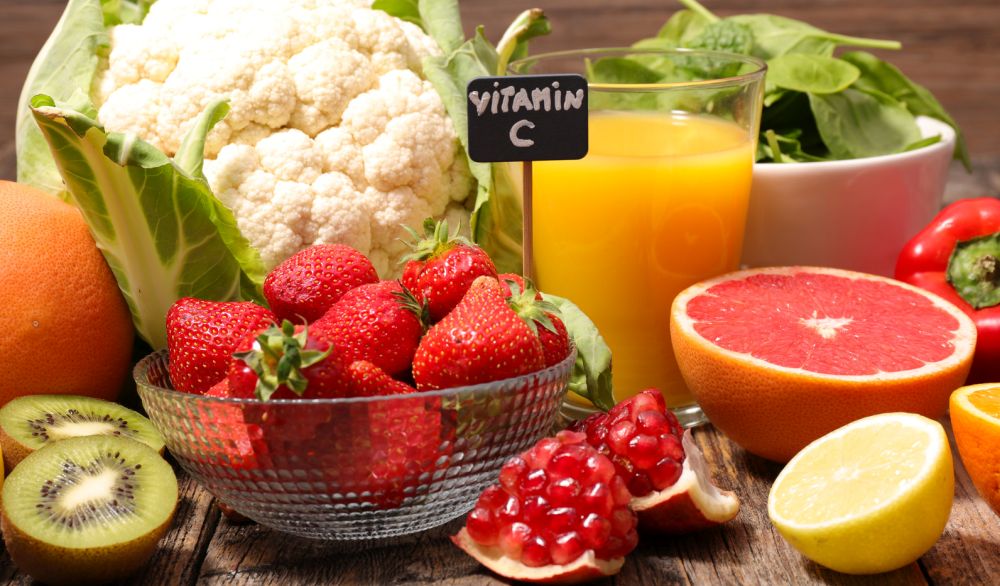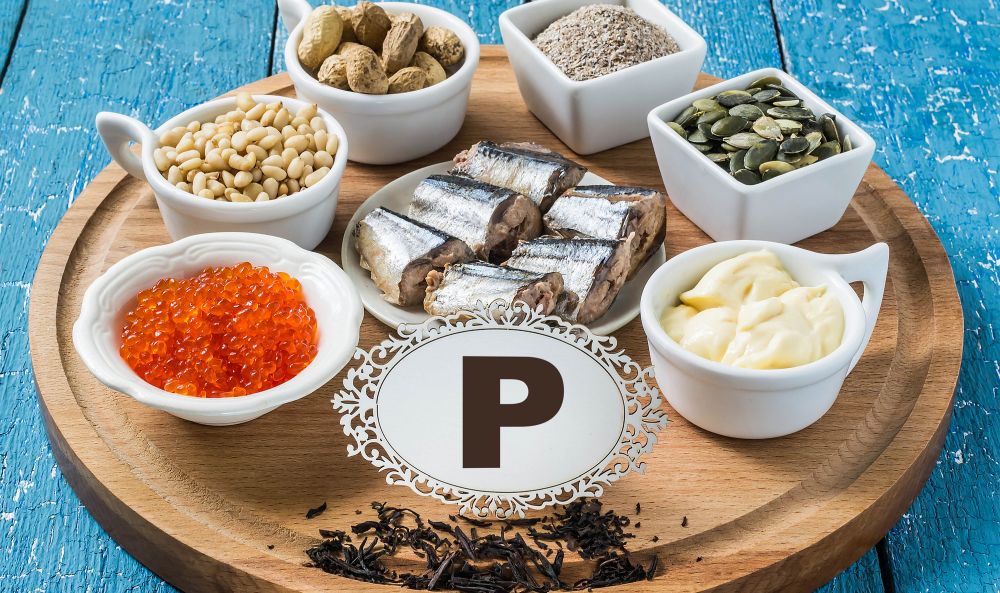Vitamins and minerals are needed by your body in significantly smaller quantities than, for example, proteins, fats and carbohydrates, but they are very important for health because they participate in many biochemical processes important for the normal functioning of your body.
They help strengthen the immune system, support normal growth and development, and the cells and organs of your body perform their tasks better in their presence.
Vitamins and minerals are widely available in the natural foods we eat. So, before you reach for vitamins in a jar, try to find your daily dose of vitamins in nature.
You are probably wondering what is the daily need for vitamins and minerals in your body? Look at the table that will show you the possibilities of intake through nutrition. We list in the table the best sources of vitamins and minerals and the recommended daily dose.
Keep in mind that the recommended amounts of vitamins and minerals are completely individual and we recommend consulting your doctor before consumption.

Vitamin A
Sources of vitamins/minerals: Liver, carrots, sweet potatoes, pumpkin, apricots, green leafy vegetables, mango, cantaloupe, tuna
Vitamin/mineral function: Vitamin A is important for controlling the growth and development of epithelial tissue, it participates in the creation of the visual pigment – rhodopsin. Together with some carotenoids, it is believed to enhance the function of the immune system. Due to its strong effect on epithelial tissue, retinol is used in the treatment of many skin diseases.
Deficiency signs: Night blindness, dry eyes, dry and scaly skin, increased susceptibility to infections. Vitamin A deficiency is rare because many foods are rich in either already created vitamin A or beta carotene, which is the basis for its creation.
Recommended daily dose: Adults and teenagers: 800 RE* Children up to one year: 375 RE Children 1-3 years: 400 RE Children 4-6 years: 500 RE Children 7-10 years: 700 RE *RE = retinol equivalent, unit for measuring vitamin A.
Vitamin B1 (Thiamine)
Sources of vitamins/minerals: Whole grains, seeds, nuts, wheat germ, sunflower seeds, pork, oats, tuna, salmon, avocado, pasta and grains (whole or fortified with vitamin B1), beans, legumes, tofu, artichokes.
Vitamin/Mineral Function: Vitamin B1 is essential in carbohydrate metabolism. Therefore, the body’s needs are increased with a predominantly carbohydrate diet.
Deficiency signs: Weakness, nervous system disorders, cardiac arrest. In the developed world, deficiency of this vitamin is rare, with the exception of alcoholics, since excessive alcohol intake prevents the absorption of thiamine.
Recommended daily dose: Adults and teenagers: women 1.1 mg, men 1.5 mg. Children up to one year: 0.3-0.4 mg. Children 1-3 years: 0.7 mg. Children 4-6 years: 0.9 mg. Children 7-10 years: 1.0 mg.

Vitamin B2 (Riboflavin)
Sources of vitamins/minerals: Offal, dairy products, seafood, eggs, meat, enriched breads and cereals, almonds, tofu, artichokes, turnips, spinach, sweet potatoes.
Vitamin/mineral function: Vitamin B2 is indirectly involved in maintaining the integrity of the erythrocyte membrane. It is often called the factor of cell growth or respiration. It is involved in the breakdown of fats, proteins and carbohydrates. It is necessary in the utilization of energy from food. It is involved in metabolic processes throughout the body.
Deficiency signs: Dry, scaly, cracked skin; eyes extremely sensitive to bright light, painful red tongue. Vitamin B2 deficiency is rare in the developed world.
Recommended daily dose: Adults and teenagers: women 1.3 mg, men 1.7 mg. Children up to one year: 0.4-0.5 mg. Children 1-3 years: 0.8 mg. Children 4-6 years: 1.1 mg. Children 7-10 years: 1.2 mg.
Vitamin B3 (Niacin)
Sources of vitamins/minerals: Seafood, tuna, swordfish, salmon, meat, peanuts and peanut butter, wheat germ, wheat bran, fortified cereals and pasta, barley, rice, buckwheat, wild rice, sunflower seeds, potatoes, avocados, mushrooms.
Function of vitamins/minerals: It is used in the prophylaxis and treatment of pellagra, it is also used in the therapy of diseases of the circulatory system and migraine, hyperlipidemia. Vitamins B3 are also used in the treatment of acne and diabetes mellitus type 1.
Deficiency signs: Dry, cracked, inflamed skin; digestive and nervous system disorders. Deficiency of this vitamin is rare in developed countries. It is a supplement to enrich many types of food, and the body can produce niacin from tryptophan, an amino acid found in many protein-rich foods.
Recommended daily dose: Adults and teenagers: women 15 mg, men 19 mg. Children up to one year: 5-6 mg. Children 1-3 years: 9 mg. Children 4-6 years: 12 mg. Children 7-10 years: 13 mg.

Vitamin B6 (Pyridoxine)
Sources of vitamins/minerals: Tuna, salmon, avocado, potatoes, meat, bananas, chickpeas, plum juice (fresh or dried), sunflower seeds, sweet potatoes, artichokes, rice bran.
Vitamin/mineral function: Acts as a coenzyme for protein metabolism. If the body needs additional energy, it helps the cells to convert proteins and glycogen from the liver into energy. It strengthens the immune system and helps build neurotransmitters in the brain.
Deficiency signs: Cramps, nervous system disorders, inflamed skin. Deficiency of vitamin B6 is rare since it is found in most protein foods, and the usual diet is rich in protein.
Recommended daily dose: Adults and teenagers: women 1.6 mg, men 2.0 mg. Children up to one year: 0.3-0.6 mg. Children 1-3 years: 1.0 mg. Children 4-6 years: 1.1 mg. Children 7-10 years: 1.4 mg.
Vitamin B12
Sources of vitamins/minerals: Seafood, meat, yogurt, milk, cheese, eggs
Vitamin/Mineral Function: Directly or indirectly, vitamin B12 is involved in almost all metabolic systems. It is essential for the normal growth and nutrition of all cells, for normal erythropoiesis, for the regulation of epithelial cells.
Deficiency signs: Cramps, nervous system disorders, inflamed skin. Anemia, nerve damage.
Recommended daily dose: Adults and teenagers: 2 mcg. Children up to one year: 0.3-0.7 mcg. Children 1-3 years: 0.7 mcg. Children 4-6 years: 1.0 mcg. Children 7-10 years: 1.4 mcg.

Vitamin C (ascorbic acid)
Sources of vitamins/minerals: The richest source of vitamin C is a variety of fruits and vegetables. It has the most pomegranate, 2000 mg/100g. After it there are: black currant – 200 mg/100g, red pepper – 190 mg/100g, parsley – 130 mg/100g, kiwi – 90 mg/100g, broccoli – 90 mg/100g, red currant – 80 mg/100g, papaya – 60 mg/100g, strawberries – 60 mg/100g, orange – 50 mg/100g. Followed by lemon, melon and cauliflower with 40 mg/100g, then grapefruit, raspberry, tangerine, spinach and kale with 30 mg/100g. Lime, mango and potato have 20 mg/100g, and tomatoes, blueberries, pineapple, grapes, apricots, plums and watermelons have 10 mg/100g. 9 mg/100g have bananas and carrots, 8 avocados, 7 cherries and peaches, 6 apples and blackberries, 5 beets, 4 pears and lettuce, 3 cucumbers, 2 mg/100g eggplant and figs…
Vitamin/mineral function: Vitamin C builds strong connective tissue that stabilizes muscles and bones, it is an antioxidant that improves iron absorption; accelerates wound healing; maintains capillary strength; strengthens the immune system, proven to help in the treatment of bronchitis, bruises, colds, glaucoma, high cholesterol, infections and wounds.
Deficiency signs: Cramps, nervous system disorders, inflamed skin. Bleeding gums, slow wound healing; easy bruising, weakened immunity.
Recommended daily dose: Adults and teenagers: 60 mg. Children up to one year: 30-35 mg. Children 1-3 years: 40 mg. Children 4-6 years: 45 mg. Children 7-10 years: 45 mg.
Vitamin D
Vitamin/Mineral Sources: For most people, the source of vitamin D is the sun. In food, it is found in milk, dairy products, yeast, egg yolk, oil from cod liver and fish meat from cold seas, salmon and herring.
Vitamin/Mineral Function: Improves the absorption of calcium and phosphorus, which are necessary for strong bones. Sunlight stimulates a cholesterol-like substance that creates vitamin D.
Signs of deficiency: Brittle, brittle bones and weak muscles – a disease called rickets.
Recommended daily dose: Generally 10 to 15 minutes of exposure of the hands, shoulders or face to the sun 2-3 times a week is enough to meet the daily needs for vitamin D. In food, the recommended daily dose for adults and teenagers: 200 IU* Children from birth up to 6 months: 300 IU 6 months – 14 years: 400 IU *IU International Unit

Vitamin E
Sources of vitamins/minerals: Polyunsaturated oils and seeds: sunflower, safflower, canola, corn; almonds, hazelnuts, peanut butter, wheat germ, tomato concentrate, avocado, peaches, oat bran. Best source: sunflower seeds.
Vitamin/Mineral Function: The action of vitamin E in the body is multifaceted and still not fully understood. Natural vitamin E is a complex of 8 different substances. Its most important function in the body is acting as an antioxidant and neutralizer of free radicals. Vitamin E prevents the destruction of unsaturated fatty acids and sensitive substances in the body by free radicals. It protects cell membranes and maintains good function of nerves, muscles, skin, red blood cells, heart and blood circulation.
Deficiency signs: Anemia, neurological damage. The consequences of vitamin E deficiency are not as clear as with other vitamins.
Recommended daily dose: Adults and teenagers: Women: 8 mg, men: 10 mg. Children up to one year: 3-4 mg. Children 1-3 years: 6 mg. Children 4-6 years: 7 mg. Children 7-10 years: 7 mg.
Vitamin K
Sources of vitamins/minerals: Green leafy vegetables, kale, broccoli, onions, lettuce, cabbage, spinach.
Vitamin/Mineral Function: Vitamin K plays an important role in blood clotting. Some proteins, important for normal bone metabolism, on which the intake of calcium in the bones depends, are also dependent on vitamin K.
Deficiency signs: Bleeding, reduced blood clotting. Deficiency is rare because the bacteria that make up the normal intestinal flora produce the vitamin K the body needs.
Recommended daily dose: Adults and teenagers: Women: 65 mg Men: 70 mg. Children up to one year: 5-10 mg. Children 1-3 years: 15 mg. Children 4-6 years: 20 mg. Children 7-10 years: 30 mg.

Vitamin F
Sources of vitamins/minerals: Asparagus, pinto beans, lentils, chickpeas, artichokes, spinach, kidney beans, avocado, papaya, wheat germ, fortified cereals.
Vitamin/Mineral Function: Acts as a coenzyme that aids in the production of DNA, the matrix for cellular reproduction. Necessary for the formation of red blood cells and the formation of the bones of the spine in the fetal age.
Deficiency signs: Anemia; spina bifida in the fetus, growth retardation.
Recommended daily dose: Adults and teenagers: 400 mcg. Pregnant women: 800 mcg. Children up to one year: 25-35 mcg. Children 1-3 years: 50 mcg. Children 4-6 years: 75 mcg. Children 7-10 years: 100 mcg.
Calcium
Sources of vitamins/minerals: seafood, dark green vegetables, sesame, sunflower seeds, milk, cheese, eggs, nuts, dried fruits, sardines.
Function of vitamins/minerals: Prevents the formation of viral mouth sores, regulates heart rhythm, kidney function, lowers blood pressure, is involved in structuring DNA, stimulates muscle contractions. Calcium is the most abundant mineral in the human body, it is necessary for healthy bones and almost every cell needs it for normal functioning.
Deficiency signs: muscle spasms in the arms and legs, softening of the bones, back and leg cramps, bone fragility, rickets, poor growth, osteoporosis, decaying teeth, depression…
Recommended minimum daily dose: 800 mg – 1200 mg.

Besides
Sources of vitamins/minerals: Brewer’s yeast, liver, lean meat, poultry, whole grains, eggs and cheese.
Vitamin/Mineral Function: Chromium keeps blood sugar levels stable (less cravings for sugars and carbs while losing fat).
Deficiency signs: Aversion to glucose in diabetics, arteriosclerosis, heart disease, slowed growth, obesity, exhaustion.
Recommended minimum daily dose: 50 – 200 mcg.
Bake
Sources of vitamins/minerals: Seafood, offal, nuts, seeds , green vegetables, black pepper, cocoa and water if it passes through copper pipes.
Vitamin/mineral function: The role of copper is in the process of transferring electrons to the cell membranes and mitochondria (powerhouse) of the cell. Together with iron, it participates in the red blood cell count.
Deficiency signs: They can appear as general weakness, impaired breathing, skin vulnerability.
Recommended minimum daily dose: 1.5 to 3 mg.

Iodine
Sources of vitamins/minerals: Onions, beans, seafood.
Vitamin/Mineral Function: Iodine is known as an element that almost exclusively occurs in the thyroid gland, where it plays a major role in the thyroid hormone thyroxine (T4). Thyroxine plays a role in regulating the burning process and thus can manage the pace of energy collection.
Deficiency signs: Thyroid enlargement, slowed mental reactions, dry skin and hair, weight gain, loss of physical and mental vitality.
Recommended daily dose: 150 mcg.
Iron
Vitamin/Mineral Sources: Iron is found in red meat, chicken, seafood, and other animal foods, and ferric iron is found in dark green vegetables, whole grain products, nuts, and other plant foods.
Function of vitamins/minerals: Iron is an essential element in the construction of oxidation and reduction processes in the cell, a central factor in the oxygen transport processes of higher living beings. This means that it participates in the transport of oxygen and the removal of carbon dioxide from the lungs before it is exhaled as a gas.
Deficiency signs: Deficiency signs are: fatigue, headache, weakness, irritability, dizziness, heart palpitations, heavy breathing, tongue burning, constipation, brittle nails.
Recommended daily dose: 10 mg.

Magnesium
Sources of vitamins/minerals: Seafood, whole grains, yellow corn, lentils, dried fruits, nuts, leafy vegetables, apples, celery, lemons, figs, grapefruit.
Vitamin/mineral function: Magnesium relaxes muscles, maintains a stable heart rhythm, normal nerve and muscle function, and stimulates metabolism.
Deficiency signs: Heart spasms, nervousness, muscle irritability, confusion, kidney stones…
Recommended daily dose: 350 mg.
Eat
Sources of vitamins/minerals: Bananas, oranges, whole grains, brown rice, walnuts, wheat germ, beans, peas and strawberries.
Vitamin/Mineral Function: Manganese is needed for skin and bone health, cartilage formation, and glucose and lipoprotein metabolism.
Deficiency signs: Bone changes, lethargy, movement disorders, neurological disorders, sterility and reduced glucose tolerance may occur.
Recommended daily dose: 2.5 to 5 mg.

Phosphorus
Sources of vitamins/minerals: Whole grains, legumes, nuts, vegetables, sunflower seeds.
Vitamin/mineral function: Phosphorus is a macromineral, whose role in the body is multiple. It is found in the body in the form of phosphate or hydrogen phosphate ions. In bones, phosphorus forms apatite (calcium phosphate) with calcium, which is an important structural component of the bone matrix. Brain tissue is rich in phosphorus, which means that phosphorus is essential, both for growth and development, and for good brain functioning. The most important role of phosphorus is in cellular biochemistry.
Deficiency signs: Phosphorus deficiency is rare, but if it does occur, it causes weakness and vomiting, as well as osteomalacia and rickets.
Recommended daily dose: 800 mg.
Potassium
Sources of vitamins/minerals: Bananas, seafood, green pepper, dried fruit.
Vitamin/mineral function: Potassium is the most important cell element. It takes care of charge equalization in the finest regulating mechanisms of the cell, is the main factor in the regulation of body fluids, participates in the electrical stabilization of the cell membrane and acid-base content. Potassium stabilizes nerve and muscle functions, plays a role in many basic biochemical processes.
Deficiency signs: External symptoms are: muscle weakness, nausea, changes in heart muscle activity and, as a result, a drop in blood pressure.
Recommended daily dose: 2000 mg.

Selenium
Sources of vitamins/minerals: Brazil nuts , whole grains, asparagus, garlic, eggs, mushrooms, lean meats and seafood.
Function of vitamins/minerals: Of particular importance is its function of protection against poisoning (necrosis of the liver). The human body contains about 10-25 mg of selenium . Its action is recognizable in the protection against heart attack, angina pectoris, rheumatic-arthritic diseases, disturbances in the conduction of nerve impulses and a weaker immune state.
Deficiency signs: Premature aging, heart disease, dandruff and loose skin may occur.
Recommended daily dose: 70 mcg.
Sodium
Sources of vitamins/minerals: Table salt
Function of vitamins/minerals: Sodium ions are extremely important for the regulation of acid-base balance and, together with calcium and potassium ions, maintain the function of nerve and muscle cells.
Signs of deficiency: A lack of sodium in a normal diet is mostly not possible, but it can occur due to some diseases, such as diarrhea, vomiting, burns and tumors.
Recommended daily dose: 500 mg.

Zinc
Sources of vitamins/minerals: Sunflower and pumpkin seeds , seafood, organically grown meat, mushrooms, germ, eggs.
Function of vitamins/minerals: Zinc is present in all organs, and it is most abundant in erythrocytes, bones, muscles, liver, prostate. It is involved in a large number of enzymatic systems in the body (eg cell growth and division, immune system, reproduction…).
Deficiency signs: It can appear as delayed sexual maturation, long-term wound healing, white dots on fingernails, growth retardation, signs of tension, fatigue, reduced vitality, tendency to infections.
Recommended daily dose: 15 mg.

